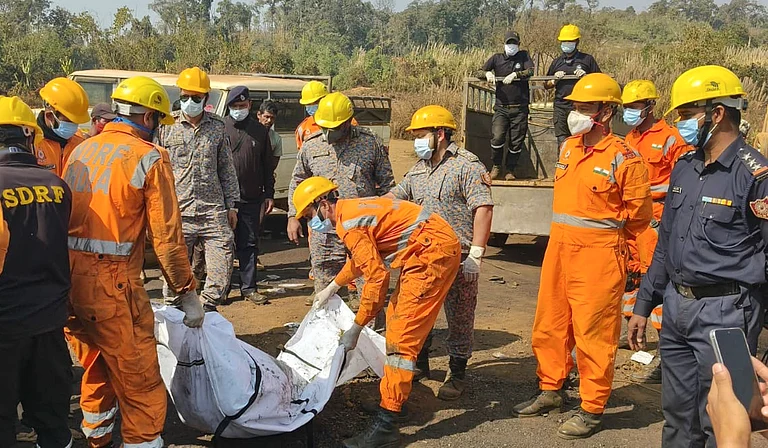One by one, the groups introduced themselves. New York Greens, War Resisters League, Artists’ Network, Jews for Racial and Economic Justice, Palestinian Right to Return Coalition, Forum of Indian Leftists, Center for Immigrant Families, Armenian Sisters, Freedom Socialist Party, Battered Women Resource Center, Taxi Workers Alliance… The list read like a who-is-who of progressive politics in New York City while the sheer number of groups was a reminder of the fracturing of the left in the age of postmodernism. Arguments brewed among the participants. Some wanted to endorse peace, some wished to understand violence, and many predictably invoked Gandhi’s "an eye for an eye makes the whole world blind."
But by the end of the meeting, the group had agreed to converge on a six-pronged position.
One, the attacks must be unequivocally condemned. There could be no possible justification for the mass murder of thousands of innocent people. The acts of the suicidal terrorists were morally indefensible, no matter what their motives.
Two, the U.S. must recognize its role in creating the monster that struck back with such vengeance. The contention that the U.S. was reaping a dragon’s teeth harvest was generally endorsed. We have seen the enemy, the opinion went, and the enemy is us. The numerous atrocities on the unsavory resume of American foreign policy were cataloged. The list was long. And chilling. 1954: Thousands of Guatemalan peasants killed by U.S. installed dictatorships. 1965: 3,000 murdered in the Dominican Republic. 1973: 30,000 casualties in a CIA sponsored coup in Chile. 1965-1975: More than a million killed in Indonesia and East Timor. 1980s: 30,000 civilian deaths in Nicaragua. Thousands more in El Salvador, Panama, Palestine, Angola, Vietnam, Cambodia, Lebanon, Libya, Yugoslavia, Sudan. And of course, Iraq. 200,000 killed in Operation Desert Storm including thousands of retreating Iraqi soldiers on the infamous "highway of death." A million more, including half a million children, dead due to the sanctions.
Three, war was not the answer. The cycle of violence ought to be broken, not perpetuated.
Four, the government should not be allowed to use the terrorist attacks in order to erode civil liberties.
Five, global peace could only be achieved through global justice.
And six, the growing swell of anti-Muslim, anti-Arab, anti-immigrant sentiment must be strongly opposed.
The mood was upbeat. Esperenza Martel of ProLibertad summed up the optimism: "We have the power to bring peace to the world. We have done it before. And we can do it again."
On the way back home, several of us stopped at Union Square, the site of a candle-light vigil the previous night. Bunches of people were standing around. A few guitars were out and peace songs were being strummed. Wax from hundreds of candles had melted and reformed in multicolored pools. The posters breathed a collective message of peace. "War is Not the Answer." "Islam is Not the Enemy." And of course, "No Justice, No Peace."
Slowly, but steadily, a similar mood has been building up around the country. News filters in about scores of peace rallies in large cities and small towns. A thousand march in a peace rally in Washington DC on September 14th. A thousand more in the tiny town of Northampton in Massachusetts on September 16th. Hundreds stand in peace vigils each night at Boston’s Copley Square. A huge rally at Sproul Plaza in Berkeley where participants sport green bands to indicate their solidarity with Muslim and Middle Eastern people. Another at the University of Madison. As Farah, a New York organizer puts it "our response to the killing of innocent people cannot mirror the actions of those we condemn. Real courage lies in ending violence, not replicating it."
What has been surprising is the speed with which the anti-war sentiment has been harnessed. Teach-ins have been organized on almost every college campus in the country and the message is unwaveringly one of restraint and peace. Anantakrishna, an organizer of one such event at the University of Minnesota, says that the response is "very heartening" as is the rapidity with which the anti-war movement has got off the ground. "It took five years of the Vietnam war before the first teach-in was organized," he says, "and now, there are already hundreds being held each day across the country."
There is a certain sense of urgency among the organizers. Rahul Mahajan and Bob Jensen have been running the No War Collective out of Austin, Texas for the last several years. Mahajan, a graduate student at the University of Texas, says that "there is a chance that the destruction unleashed on Iraq during the Gulf War will be nothing compared to what is coming. Behind all this talk of retribution are U.S. plans for an extended control of the region. This drive to vengeance and domination must be resisted around the world." Mahajan also sees a connection between the aggressive stance towards Afghanistan and America’s interest in constructing the Central Asian oil pipeline through the country. Jensen, a journalism professor and a long-time activist claims that "although much of the public is falling into a war posture, significant numbers are starting to resist. There is a new interest in the destructive consequence of U.S. foreign policy, and an openness to radical change. Unfortunately, those voices get little exposure in our media."
It is this attitude of the mainstream media that invokes some anxiety in the anti-war activists. The periodic spurts of optimism are coupled with a sense of foreboding, a dark feeling that they might be spitting into the wind. For every Z Magazine and Common Dreams website that carry anti-war opinions, there are hundreds of others where the mood is different. In a characteristic piece, Steve Dunleavy of the New York Post wrote on September 12: "The response to this…should be as simple as it is swift—kill the bastards. A gunshot between the eyes, blow them to smithereens, poison them if you have to. As for cities or countries that host these worms, bomb them into basketball courts."
The media spin-doctors have been pushing for retaliation. It is inevitable that bombs will drop on some region in the Middle East and claim innocent lives through "collateral damage." As the former Secretary of State, Lawrence Eagleburger put it bluntly on CNN, "you have to kill some of them, even if they are not directly involved in this thing." Somebody will have to pay the price for the grotesque amputation of the most famous skyline in the world. And the powerful will preen and pretend that they are on the side of truth. The deployment of U.S. troops is already under way and has been dubbed "Operation Infinite Justice."
But in Boston, New York, Chicago, Los Angeles and almost everywhere, the attitude among the anti-war group reflects the pessimism of the intellect, but an optimism of the will. South Asian groups have been particularly active in this arena. The Alliance for a Democratic and Secular South Asia, INSAF ("a coalition dedicated to the promotion of peace and social justice in South Asia"), the Forum of Indian Leftists, Desis Rising Up and Moving, South Asians Against Police Brutality, Youth Solidarity Summer, and a number of other desi groups have been organizing rallies, marches, vigils, and awareness raising campaigns with compelling energy. The Asian American Legal Defense and Education Fund has been offering legal advice and help to those who have been victims of hate crimes. The INSAF vigil, labeled "South Asians United in Grief" was held at Jackson Heights, a predominantly South Asian neighborhood and was endorsed by the local merchants’ association.
As far as the mainstream is concerned, Samuel Huntington’s clash of civilizations (Islam vs. the West) has already started. But this time, the margins are not merely wringing their hands in despair. They are fighting back. A broad coalition of activists had planned a national march on Washington on September 29 to demonstrate against "reactionary foreign and domestic policy and the IMF and World Bank." The priorities have been reshuffled in a hurry. The march stands as planned. Only, the focus has changed. The demonstration will take place. But the challenge is new. To stop war and produce economic, political and moral conditions that will ensure justice, and therefore, peace.
Coda: A couple of days after the World Trade Center came tumbling down, I received an email from Brendan, a close friend at Madison. Along with some information about anti-war organizing efforts was a one-line personal note that read "Let us turn this thing around." Optimism of the will indeed.
(Mir Ali Husain is an activist-organizer in New York City. In his spare time, he works as a professor at a university.)

























